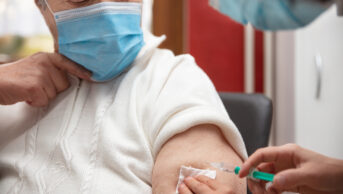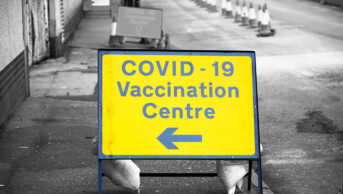
Shutterstock.com
A memorial to the NHS staff who have died from COVID-19 was unveiled in Edinburgh on 13 October 2022. It consists of four hauntingly life-sized statues of healthcare workers in scrubs, the pain and exhaustion of working through the pandemic etched on their faces.
There is no doubt that NHS and care staff have been severely affected by COVID-19 — they have had to treat large numbers of sick patients, at considerable personal risk to themselves and their families.
In particular, at the start of the pandemic, NHS staff were at a much higher risk of infection and death from COVID-19. This has lasting effects — the latest data from the Office for National Statistics suggest that 5% of people working in the healthcare sector currently have ongoing problems with long COVID. And there are estimates that more than 1,500 health and care staff have died during the pandemic.
But these sacrifices have been all too quickly forgotten. We have moved quickly from banging pots and pans in support of health and social care workers outside our homes, to discussions about the NHS backlog and now debating whether healthcare workers should take industrial action over pay. And this is reflected in a more general reluctance to learn lessons from the experiences of NHS staff.
The Pharmaceutical Journal revealed in November 2022 that the Health and Safety Executive (HSE) decided not to investigate nearly 300 reports of occupational exposure to COVID-19 submitted by NHS organisations since January 2020, including 83 deaths. Responding to a Freedom of Information request, HSE said these reports were labelled as “non-reportable” and not followed up because the body claimed there was “no clear evidence” occupational exposure was the likely cause of the COVID-19 infection.
However, NHS staff trade unions argued that it was a “shameful dereliction of duty” not to investigate, particularly as employers would only submit a report if they thought COVID-19 infection at work was highly probable. And this comes after HSE was criticised for its guidance on reporting incidents where staff have been exposed to COVID-19.
The first guidance, published in April 2020, advised employers that they must report an incident “if there is reasonable evidence” that someone diagnosed with COVID-19 was likely exposed to the virus because of their work. However, this example was later removed from the HSE website and HSE said: “It will be very difficult, if not impossible, for employers to establish whether or not any infection in an individual was contracted as a result of their work.” Unions say that this change in guidance may have resulted in widespread underreporting of COVID-19 exposure at work.
It is important to learn from these deaths, so that employers, governments and others can ensure the health system and wider country is better prepared for the next time there is a similar event. For instance, how much of a factor was the lack of personal protective equipment for NHS workers at the start of the pandemic? Was the confused messaging over mask wearing and ventilation in NHS buildings also partly to blame?
We will not be able to understand the likely transmission routes the virus took, and how to better protect health workers and their patients in future, if the government body responsible does not fully investigate cases.
It is welcome that the UK’s ‘COVID-19 Inquiry‘, which began work in June 2022, has begun to examine the UK government’s decision-making during the COVID-19 pandemic, along with its response to it. But we will all fail to learn the lessons of the pandemic if all the information is not available to the inquiry.
We call for all these incidents to be properly investigated and a change in policy at HSE. It is vital for the safety of those who are putting themselves in such danger, now and in the future. PJ


